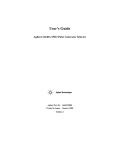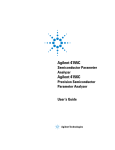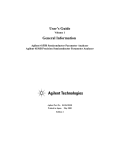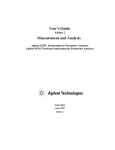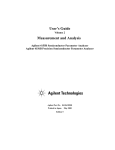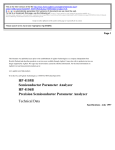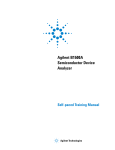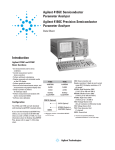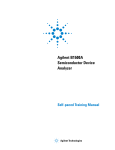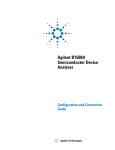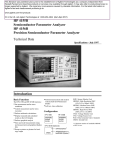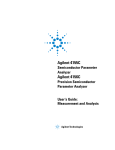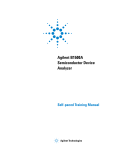Download Agilent Technologies 16440A User`s guide
Transcript
Agilent 16440A SMU/Pulse Generator Selector User’s Guide Agilent Technologies Notices © Agilent Technologies 1994 - 2007 Warranty No part of this manual may be reproduced in any form or by any means (including electronic storage and retrieval or translation into a foreign language) without prior agreement and written consent from Agilent Technologies, Inc. as governed by United States and international copyright laws. The material contained in this document is provided “as is,” and is subject to being changed, without notice, in future editions. Further, to the maximum extent permitted by applicable law, Agilent disclaims all warranties, either express or implied, with regard to this manual and any information contained herein, including but not limited to the implied warranties of merchantability and fitness for a particular purpose. Agilent shall not be liable for errors or for incidental or consequential damages in connection with the furnishing, use, or performance of this document or of any information contained herein. Should Agilent and the user have a separate written agreement with warranty terms covering the material in this document that conflict with these terms, the warranty terms in the separate agreement shall control. Manual Part Number 16440-90000 Edition Edition 1, February 1994 Edition 2, April 1995 Edition 3, August 1997 Edition 4, January 2000 Edition 5, November 2007 Agilent Technologies, Inc. 5301 Stevens Creek Blvd Santa Clara, CA 95051 USA Technology Licenses The hardware and/or software described in this document are furnished under a license and may be used or copied only in accordance with the terms of such license. Restricted Rights Legend If software is for use in the performance of a U.S. Government prime contract or subcontract, Software is delivered and licensed as “Commercial computer software” as defined in DFAR 252.227-7014 (June 1995), or as a “commercial item” as defined in FAR 2.101(a) or as “Restricted computer software” as defined in FAR 52.227-19 (June 1987) or any equivalent agency regulation or contract clause. Use, duplication or disclosure of Software is subject to Agilent Technologies’ standard commercial license terms, and non-DOD Departments and Agencies of the U.S. Government will receive no greater than Restricted Rights as defined in FAR 52.227-19(c)(1-2) (June 1987). U.S. Government users will receive no greater than Limited Rights as defined in FAR 52.227-14 (June 1987) or DFAR 252.227-7015 (b)(2) (November 1995), as applicable in any technical data. This product complies with the WEEE Directive (2002/96/EC) marking requirements. The affixed label indicates that you must not discard this electrical/ electronic product in domestic household waste. Product Category: With reference to the equipment types in the WEEE Directive Annex I, this product is classed as a “Monitoring and Control instrumentation” product. Do not dispose in domestic household waste. To return unwanted products, contact your local Agilent office, or see www.agilent.com/environment/product/ for more information. Safety Summary The following general safety precautions must be observed during all phases of operation, service, and repair of this instrument. Failure to comply with these precautions or with specific warnings elsewhere in this manual may impair the protections provided by the equipment. In addition, it violates safety standards of design, manufacture, and intended use of the instrument. Agilent Technologies, Inc. assumes no liability for customer’s failure to comply with these requirements. • GROUND THE INSTRUMENT This is Safety Class I instrument. To minimize shock hazard, the instrument chassis and cabinet must be connected to an electrical ground. The power terminal and the power cable must meet International Electrotechnical Commission (IEC) safety standards. • DO NOT OPERATE IN AN EXPLOSIVE ATMOSPHERE Do not operate the instrument in the presence of flammable gases or fumes. Operation of any electrical instrument in such an environment constitutes a definite safety hazard. • KEEP AWAY FROM LIVE CIRCUITS Operation personnel must not remove instrument covers. Component replacement and internal adjustments must be made by qualified maintenance personnel. Do not replace components with power cable connected. Under certain conditions, dangerous voltages may exist even with the power cable removed. To avoid injuries, always disconnect power and discharge circuits before touching them. • DO NOT SERVICE OR ADJUST ALONE Do not attempt internal service or adjustment unless another person, capable of rendering first aid and resuscitation, is present. • DO NOT SUBSTITUTE PARTS OR MODIFY INSTRUMENT Because of the danger of introducing additional hazards, do not install substitute parts or perform any unauthorized modification to the instrument. Return the instrument to a Agilent Technologies Sales and Service Office for services and repair to ensure that safety features are maintained. • DANGEROUS PROCEDURE WARNINGS Warnings, such as example below, precede potentially dangerous procedures throughout this manual. Instructions contained in the warnings must be followed. WARNING Dangerous Voltage, capable of causing death, are present in this instrument. Use extreme caution when handling, testing, and adjusting. Safety Symbols The general definitions of safety symbols used on equipment or in manuals are listed below. Instruction manual symbol: the product will be marked with this symbol when it is necessary for the user to refer to the instruction manual in order to protect against damage to the instrument. Indicates dangerous voltage and potential for electrical shock. Do not touch terminals that have this symbol when instrument is on. Protective conductor terminal. For protection against electrical shock in case of a fault. Used with field wiring terminals to indicate the terminal which must be connected to ground before operating equipment. Frame or chassis terminal. A connection to the frame (chassis) of the equipment which normally includes all exposed metal structures. Indicates earth (ground) terminal. Alternating current. Direct current. ON (Supply). OFF (Supply). STANDBY (Supply). CAT 1 Means INSTALLATION CATEGORY I. Measurement terminals on the rear panel comply with INSTALLATION CATEGORY I. WARNING The warning sign denotes a hazard. It calls attention to a procedure, practice, condition or the like, which, if not correctly performed or adhered to, could result in injury or death to personal. CAUTION The caution sign denotes a hazard. It calls attention to an operating procedure, practice, condition or the like, which, if not correctly performed or adhered to, could result in damage to or destruction of part or all of the product. User's Guide User's Guide Agilent 16440A SMU/Pulse Generator Selector is one of the accessories available for Agilent 4155/4156 Semiconductor Parameter Analyzers and Agilent B1500A Semiconductor Device Analyzer. The selector is for automatically switching the measurement resource that is connected to a DUT pin. The measurement resource can be SMU, PGU, or SPGU. This manual consists of the following sections. NOTE • “Introduction” • “Operation” • “Installation” • “Maintenance” • “Specifications” To Use the Selector The 4155/4156 must be equipped with Agilent 41501 SMU/pulse generator expander that contains two PGUs. The B1500A needs Agilent 16445A selector adapter. NOTE Inspecting the 16440A upon Receiving When the 16440A arrives at your site, make sure that nothing is missing or damaged. Unpack the carton, then check the contents against figure and table shown in “Introduction”. If anything is missing or damaged, contact your nearest Agilent Technologies sales office. 2 Agilent 16440A User’s Guide, Edition 5 User's Guide Introduction Introduction The 16440A selector contains the following accessories. Description Agilent Part Number Quantity 16440A 1 1 SMU/Pulse Generator Selector 2 40 cm triaxial cable 04155-61605 2 3 1.5 m control cable (16440A-001) 04155-61612 1 3 m control cable (16440A-002) 04155-61611 1 40 cm control cable (16440A-003) 04155-61608 1 4 plate a 16440-60001 2 5 angle b 16440-60002 2 6 User's Guide c 16440-90005 1 a. Three screws are furnished for each plate. b. Furnished with 16440A-001/002. Two screws are also furnished for each angle. c. This document. Furnished with 16440A-001/002. Agilent 16440A User’s Guide, Edition 5 3 User's Guide Operation Operation The selector provides the automatic switching capability of the measurement resource SMU or PGU connected to a DUT terminal. This is useful for performing reliability testing (stress testing) of DUTs. For example, the selector can connect a PGU to the DUT for forcing ac stress, then can switch and connect an SMU for measuring dc characteristics. The selector has the channels CH 1 and CH 2 which provide the following conditions. CH 1 All open (no connection), SMU on, PGU on, and PGU open CH 2 All open (no connection), SMU on, and PGU on The PGU open is available only for the CH 1, and is made by keeping the PGU side mechanical relay close and opening the semiconductor relay. This is effective for frequent switching applications such as endurance tests of flash memory because the semiconductor relay is more durable than mechanical relays. If you want to add two more channels for a total of four, you can order another 16440A, which is called the “selector expander”. The selector and selector expander have identical circuits. The only difference is the channel naming. The selector has CH 1 and CH 2, and the selector expander has CH 3 and CH 4. • Controlling the selector by using the 4155/4156 Selector connections can be set by using the SMU/PG SELECTOR table on the STRESS: CHANNEL DEFINITION screen. See the 4155/4156 Setup Screen Reference manual. The switching state specified in the STRESS column is automatically performed during stressing. The switching state specified in the MEASURE column is automatically performed during measurement. For example, you can specify to connect the PGU to the DUT during stress, and connect the SMU to the DUT during measurement. So, when you press the Stress key, the PGU is automatically connected to the DUT. And when you press a measurement key, the SMU is automatically connected to the DUT. 4 Agilent 16440A User’s Guide, Edition 5 User's Guide Operation • Controlling the selector by using the B1500A Selector connections can be set by using the SMU/PG Selector tab screen of the Configuration window. And the PGU open can be set by using the Advanced window of the Measurement Setup. See the B1500A User’s Guide. If the Input/Output Path is set to Normally PGU (AUX) in the SMU/PG Selector tab screen, the selector performs automatic switching in every test. The selector channel normally makes the “PGU on” state and makes the “SMU on” state only for the test which uses the SMU connected to the Input SMU terminal. If the Semiconductor Relays on the Advanced window is set to PGU OPEN, the selector channel makes the “PGU open” state during the test. • Simplified circuit diagram This figure shows a simple circuit diagram of the selector (selector expander). The CH 1 and CH 3 circuits are different from the CH 2 and CH 4 circuits. Each channel has one mechanical relay for SMU and one mechanical relay for PGU, but the CH 1 and CH 3 circuits also have a semiconductor relay for PGU. The relays are controlled by the 4155/4156/B1500A via the control circuit. The semiconductor relay is useful when you need to perform a lot of switching (for example, read/write tests of flash ROM) because the semiconductor relay is more durable than mechanical relays. CH 1 and CH 3 can have four switching states: all open, SMU on, PGU on, and PGU open. CH 2 and CH 4 can have three switching states: all open, SMU on, and PGU on. Agilent 16440A User’s Guide, Edition 5 5 User's Guide Operation • Switching state States CH 1 and CH 3 CH 2 and CH 4 All open SMU on PGU on PGU open The switching state of a channel is indicated by the green LEDs on the selector front panel. This table shows the relation of the relays and the LEDs for each switching state. The “PGU open” state is useful if a lot of switching needs to be performed. When the switching state changes from “PGU on” to “PGU open”, only the semiconductor relay switches. This reduces the amount of times the mechanical relay is switched. The semiconductor relay has a much longer switching life than the mechanical relay. 6 Agilent 16440A User’s Guide, Edition 5 User's Guide Operation • Connecting two selectors If you use two selectors to have four channels, connect the CONTROL Output terminal of the selector to the CONTROL Input terminal of the second selector using a 40 cm control cable as shown below. Agilent 16440A User’s Guide, Edition 5 7 User's Guide Operation • Connecting the selector to the 4155/4156 Turn off the 4155/4156 and 41501 before connecting the instruments. Then connect as shown below. 4155/4156 16442A/B Test Fixture 4 2 41501 16440A Selector 3 1 16440A terminal Cable Connect to CONTROL Input 16440A-001/002 Control cable 41501 To SMU/Pulse Generator Selector Interface Input SMU a 3.0 m or 1.5 m Triaxial cable 4156 HRSMU Force 4155 MPSMU Force 41501 MPSMU or HPSMU Force Input PGU a 3.0 m or 1.5 m Coaxial cable 41501 PGU Output Selected b 40 cm Triaxial cable DUT interface (16442A or connector plate) a. You can use two inputs for one selector, and four inputs for two selectors. b. You can use two outputs for one selector and four outputs for two selectors. Selector output is either one of the PGU outputs or the SMU output. 8 Agilent 16440A User’s Guide, Edition 5 User's Guide Operation • Connecting the selector to the B1500A Turn off the B1500A before connecting the instruments. Then connect as shown below. 16440A Selector #2 for DUT terminals 3 and 4 CONTROL Input Output CH 2 CH 1 Output Input Input Output Input Input DUT terminal 1 SMU #1 Force PGU #1 or others DUT terminal 2 SMU #2 Force PGU #2 or others CONTROL Input CH 1 Output CH 2 16440A Selector #1 16445A Selector Adapter CONTROL Input Output AC power B1500A Digital I/O 16440A terminal Cable Connect to CONTROL Input 16440A-003 Control cable 16445A CONTROL Output 16445A CONTROL Input 16445A-001/002 Control cable B1500A Digital I/O Input SMU a 3.0 m or 1.5 m Triaxial cable B1500A MPSMU Force B1500A HRSMU Force B1500A HPSMU Force Input PGU a 3.0 m or 1.5 m Coaxial cable B1500A SPGU Output Output Selected b 40 cm Triaxial cable DUT interface (16442A or connector plate) a. You can use two inputs for one selector, and four inputs for two selectors. b. You can use two outputs for one selector and four outputs for two selectors. Selector output is either one of the PGU outputs or the SMU output. Agilent 16440A User’s Guide, Edition 5 9 User's Guide Installation Installation This section describes how to attach the selector to Agilent 16442A test fixture or to a shielding box. To Attach the Selector to Test Fixture You can attach your selector to the 16442A test fixture. You need a standard screwdriver. NOTE 1. Place the selector on your workbench. 2. Place the test fixture on top of the selector. 3. Position a plate on both sides. 4. Attach each plate using the three flathead screws supplied with the instrument. If you use the 16445A selector adapter, fix it under the selector by similar method. 10 Agilent 16440A User’s Guide, Edition 5 User's Guide Installation The following steps apply when using two selectors. 5. Place the second selector on your workbench. Place the selector and the test fixture on top of the second selector. 6. Position a plate on both sides. NOTE 7. Attach each plate using the three flathead screws supplied with the instrument. If you use the 16445A selector adapter, fix it under the selector by similar method. Agilent 16440A User’s Guide, Edition 5 11 User's Guide Installation If you use the 16441A R-box, attach the R-Box to the selector as shown below. 16442A/B Test Fixture 16440A Selector 16441A R-BOX NOTE If you use the 16445A selector adapter, fix it under the R-box by similar method. 12 Agilent 16440A User’s Guide, Edition 5 User's Guide Installation To Attach the Selector to Shielding Box You can attach your selector to a shielding box. You need a standard screwdriver. The following figure shows the spacing of the 16440A screw holes. You need to prepare four screws and nuts to match the screw holes. Agilent 16440A User’s Guide, Edition 5 13 User's Guide Installation If you use two selectors, connect selectors before attaching to the shielding box, as shown below. NOTE 1. Place the selector on your workbench. 2. Place the second selector on top of the selector. 3. Position a plate on both sides. 4. Attach each plate using the three flathead screws supplied with the instrument. If you use the 16445A selector adapter, fix it on top of the selector by similar method. 14 Agilent 16440A User’s Guide, Edition 5 User's Guide Installation Attach the selector to the shielding box as shown below. 1. Attach an angle bracket to each side of the selector, using the screws supplied. 2. Place the selector(s) on the side panel of the shielding box. 3. Position four nuts on the inside panel of the shielding box. 4. Attach the angle bracket to the shielding box using four flathead screws. Agilent 16440A User’s Guide, Edition 5 15 User's Guide Installation If you use the 16441A R-box, attach the R-Box to the selector on the shielding box as shown below. 16 Agilent 16440A User’s Guide, Edition 5 User's Guide Maintenance Maintenance This section provides the following maintenance information. • Cleaning • Servicing Cleaning the Selector To maintain high performance, the selector must be kept clean. Oil, perspiration, hair, dust, and dirt will degrade the board insulation, which increases leakage current and decreases measurement accuracy. Agilent Technologies recommend the following cleaning procedure. 1. Make sure that voltage or current is not present at any channel. 2. Disconnect all cables from the selector. 3. Using lint-free paper, gently wipe the chassis. For any area that will not come clean, dip the lint-free paper into alcohol and wipe the area gently. Servicing the Selector This section provides information for trained service personnel to repair the selector. When a replaceable part, which is shown with the Agilent part number in this section, needs to be replaced, order the parts from the nearest Agilent Technologies Sales and Service Office. WARNING High voltages may be present in the selector when voltage or current is applied. Be careful to avoid electric shock. Before you repair the selector, make sure that terminals are not connected to any instrument. Agilent 16440A User’s Guide, Edition 5 17 User's Guide Maintenance Circuit Block Diagram 18 Agilent 16440A User’s Guide, Edition 5 User's Guide Maintenance Replaceable Parts When soldering, use low hydrochloric acid solder (Agilent part number: 8090-0433) to prevent the flux in the solder from spreading unnecessarily, and make sure that adjacent terminals are not bridged. After soldering, make sure that there are no lint bridges, which would increase the leakage current. Reference Designation Agilent Part Number Description R1 0757-0442 Resistor 10 kΩ, 1%, 0.125 W R6 0698-3440 Resistor 196 Ω, 1%, 0.125 W R7 0757-0402 Resistor 110 Ω, 1%, 0.125 W R8 0698-3440 Resistor 196 Ω, 1%, 0.125 W R9 0698-3440 Resistor 196 Ω, 1%, 0.125 W R12 0698-0085 Resistor 2.61 kΩ, 1% Agilent 16440A User’s Guide, Edition 5 19 User's Guide Maintenance Reference Designation Agilent Part Number Description R13 0698-0085 Resistor 2.61 kΩ, 1% R15 0757-0279 Resistor 3.16 kΩ, 1% CR1 1901-0050 Diode CR2 1901-0050 Diode CR3 1901-0050 Diode CR4 1901-0050 Diode L1 9140-0210 Inductor 100 μH ±5% C1 0180-3468 Capacitor 47 μF 50 V CP1 1990-1625 Opto-isolator CP2 1990-1625 Opto-isolator K1 0490-1791 Reed Relay K2 0490-1791 Reed Relay K3 0490-1791 Reed Relay K4 0490-1791 Reed Relay DS8 1990-0967 LED Green DS9 1990-0967 LED Green DS10 1990-0967 LED Green DS11 1990-0967 LED Green DS12 1990-0967 LED Green J1 1252-1481 Connector J2 1250-1842 Connector BNC J3 1250-1842 Connector BNC J4 1252-1481 Connector SW1 3101-2885 Switch - DIP I1 0360-1641 Terminal I2 0340-0060 Terminal I3 0360-1641 Terminal I4 0340-0060 Terminal 20 Agilent 16440A User’s Guide, Edition 5 User's Guide Specifications Specifications The “supplemental information” and “typical” entries, in the following specifications are not warranted, but provide useful information about the functions and performance of the instruments. The following specifications data is specified at 23 ± 5 °C and 50 % relative humidity. • Function Agilent 16440A switches either a SMU or PGU to the associated output port. You can expand to 4 channels by adding an additional 16440A. The channel 1 PGU port provides “PGU OPEN” function, which can disconnect the PGU by opening a semiconductor relay. The 16440A can not work without Agilent 4155/4156 with 41501A/B-402/412/422 or Agilent B1500A with 16445A. • Channel configuration: 2 channels (CH1 and CH2). Can add additional 2 channels (CH3 and CH4) by adding another 16440A (selector expander). Input Output Channel 1 (CH 1) 2 (SMU and PGU) 1 Channel 2 (CH 2) 2 (SMU and PGU) 1 Channel 3 (CH 3) a 2 (SMU and PGU) 1 Channel 4 (CH 4) a 2 (SMU and PGU) 1 a. These channels are available when an 16440A SMU/PG selector expander is installed. • Voltage and current range Input port Maximum Voltage Maximum Current SMU 200 V 1.0 A PGU 40 V 0.2 A a a. This is peak-to-peak ac current. Agilent 16440A User’s Guide, Edition 5 21 User's Guide Specifications • Accessories (furnished). See Section 1 for details. • • • • Option 001 • 1.5 m control cable (Agilent part number 04155-61612) • 40 cm triaxial cable (Agilent part number 04155-61605) Option 002 • 3.0 m control cable (Agilent part number 04155-61611) • 40 cm triaxial cable (Agilent part number 04155-61605) Option 003 • 40 cm control cable (Agilent part number 04155-61608) for connecting selector to selector expander • 40 cm triaxial cable (Agilent part number 04155-61605) General specifications • • Environment Operating temperature 5 °C to 40 °C Storage temperature −40 °C to 70 °C Operating Humidity 5 % to 80 % relative humidity (at no condensation) Storage Humidity 5 % to 90 % relative humidity at 65 °C Weight Approximately 1.1 kg (2.43 lb) 22 Agilent 16440A User’s Guide, Edition 5 User's Guide Specifications Supplemental Information The following reference data is specified at 23 ± 5 °C (73 ± 9 °F) and 50 % relative humidity. • • SMU channel Leakage current less than 100 fA at 100 V Residual resistance 0.2 Ω typical Stray capacitance (force common) 0.3 pF typical at 1 MHz Stray capacitance (force guard) 15 pF typical at 1 MHz Stray capacitance (guard common) 130 pF typical at 1 MHz PGU channel Residual resistance 3.4 Ω Stray capacitance (relay off) 5 pF typical Stray capacitance (open) 700 pF typical (at 1 MHz Vin − Vout = 0 V) Signal transfer characteristics Overshoot < 5 % of pulse amplitude (at 20 ns leading and trailing time, 50 Ω pulse generator source impedance, 50 pF 1 MΩ in parallel load) Agilent 16440A User’s Guide, Edition 5 23 User's Guide Specifications Agilent 16445A Selector Adapter Specifications Agilent 16445A Selector Adapter is the connection box required to transfer the control signal from the B1500A and apply DC power to the Agilent 16440A SMU/Pulse Generator Selector. • • • Temperature Range Operating +5 °C to +40 °C Storage -20 °C to +60 °C Humidity Operating 20 % to 70 %RH, non-condensing Storage 20 % to 90 %RH, at +40 °C, non-condensing Power Requirement 100 to 240 V, 50/60 Hz • Maximum Volt-Amps (VA) 20 VA • Dimensions 250 mm (W) × 50 mm (H) × 260 mm (D) • Weight 1.0 kg 24 Agilent 16440A User’s Guide, Edition 5






























